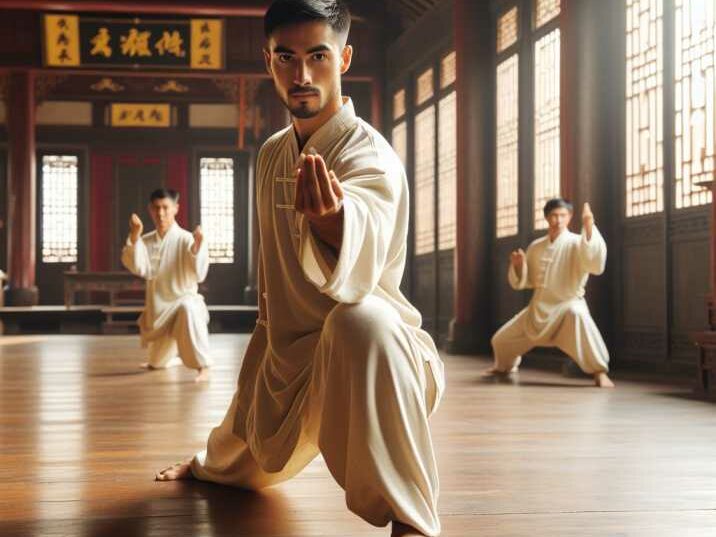Introduction:
Table of Contents
Kung Fu, a martial art with deep roots in Chinese history, has left an indelible mark on Chinese culture. From its origins in ancient China to its global popularity today, Kung Fu has not only shaped physical combat techniques but has also influenced various aspects of Chinese society, including its traditions, arts, and philosophy. In this article, we delve into the multifaceted influence of Kung Fu on Chinese culture.

Influence of Kung Fu on Chinese Culture
Historical Roots of Kung Fu:
Kung Fu, also known as Wushu in Chinese, traces its origins back to ancient China, where it was developed as a form of self-defense and combat training. Initially practiced by monks in Buddhist temples, Kung Fu evolved over centuries, incorporating elements of Taoist and Confucian philosophies. These philosophical underpinnings emphasized the importance of balance, harmony, and discipline, which became central tenets of Kung Fu practice.
Influence on Traditional Chinese Arts:
One of the most notable ways in which Kung Fu has influenced Chinese culture is through its impact on traditional Chinese arts, such as calligraphy, painting, and poetry. Practitioners of Kung Fu often integrate its principles of focus, precision, and fluidity into their artistic expressions. For example, calligraphers may apply Kung Fu techniques to achieve graceful and powerful brush strokes, while painters may draw inspiration from Kung Fu’s emphasis on balance and symmetry in their compositions.
Integration into Chinese Philosophy:
Kung Fu has also played a significant role in shaping Chinese philosophy, particularly through its alignment with Taoist and Confucian principles. Taoism, with its emphasis on naturalness and spontaneity, resonates with the fluid and adaptive nature of Kung Fu movements. Confucianism, on the other hand, emphasizes the importance of discipline, respect, and self-improvement, all of which are central to the practice of Kung Fu.
Influence on Chinese Popular Culture:
In addition to its impact on traditional arts and philosophy, Kung Fu has permeated Chinese popular culture, both domestically and internationally. Iconic Kung Fu films featuring legendary actors such as Bruce Lee and Jackie Chan have captivated audiences worldwide, showcasing the beauty and skill of Kung Fu techniques. These films not only entertain but also serve as a means of preserving and promoting Chinese cultural heritage on a global scale.
Kung Fu as a Symbol of Chinese Identity:
Kung Fu has become more than just a martial art; it is a symbol of Chinese identity and cultural pride. Whether performed as a traditional practice in ancient temples or showcased in modern competitions, Kung Fu embodies the spirit of resilience, discipline, and perseverance that are integral to Chinese culture. Its enduring popularity reflects its ability to transcend borders and unite people across different backgrounds and cultures.
Table of Information:
| Aspect of Chinese Culture | Influence of Kung Fu on Chinese Culture |
|---|---|
| Traditional Chinese Arts | Integration of Kung Fu principles into calligraphy, painting, and poetry |
| Chinese Philosophy | Alignment of Kung Fu with Taoist and Confucian principles |
| Chinese Popular Culture | Global recognition of Kung Fu through iconic films and media |
| Chinese Identity | Kung Fu as a symbol of resilience and cultural pride |
Conclusion:
In conclusion, influence of Kung Fu on Chinese culture is undeniable and multifaceted. From its historical roots in ancient China to its pervasive presence in modern popular culture, Kung Fu has left an indelible mark on Chinese society, arts, and philosophy. Its principles of discipline, harmony, and balance continue to resonate with people around the world, making Kung Fu not only a martial art but also a profound cultural phenomenon.

Frequently Asked Questions (FAQs):
- How has Kung Fu evolved over time? Kung Fu has evolved from its origins in ancient China to encompass various styles and techniques influenced by different regions and cultures.
- What role does Kung Fu play in modern Chinese society? Kung Fu continues to hold cultural significance in China, with many practitioners viewing it as a means of physical fitness, self-discipline, and cultural preservation.
- Are there different styles of Kung Fu? Yes, there are numerous styles of Kung Fu, each with its own unique techniques, forms, and philosophies. Some popular styles include Wing Chun, Shaolin Kung Fu, and Tai Chi.
- How has Kung Fu influenced martial arts beyond China? Kung Fu has had a significant impact on martial arts worldwide, inspiring the development of various styles and influencing popular culture through films, literature, and media.
- What are some misconceptions about Kung Fu? One common misconception is that Kung Fu is solely about physical combat. In reality, Kung Fu encompasses a holistic approach to self-improvement, emphasizing mental discipline, spiritual growth, and cultural understanding.


